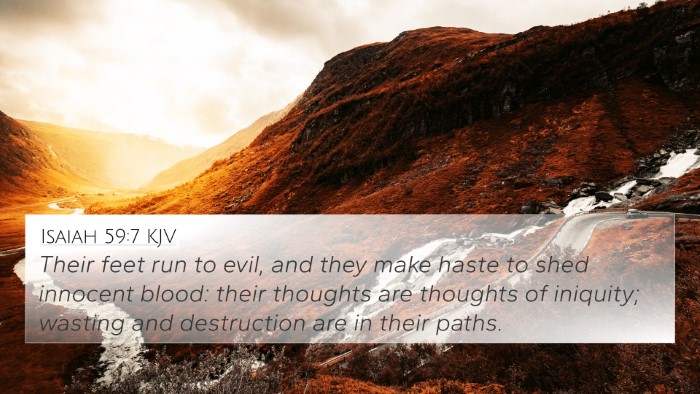Understanding Proverbs 1:16
Proverbs 1:16 states, "For their feet run to evil, and make haste to shed blood." This verse offers a crucial insight into the behavior and motivations of the wicked, emphasizing the urgency with which they pursue wrongdoing.
General Meaning
This verse vividly describes the disposition of those who engage in sinful actions, highlighting their eagerness to commit acts of violence and evil. The metaphorical imagery of 'running' conveys not only speed but also a deliberate choice to pursue destructive paths. This action contrasts with the wisdom and prudence advocated throughout the Book of Proverbs.
Commentary Insights
- Matthew Henry: He emphasizes that the phrase signifies a readiness for wickedness, where individuals are described as not just walking toward evil but running, indicating an intense pursuit of sin. It suggests a lack of reflection and an overwhelming passion for wrongdoing. Henry notes that they act swiftly, as if compelled by an internal force devoid of moral restraint.
- Albert Barnes: Barnes explains that the verse reflects the nature of the wicked who actively seek to harm others. He connects this behavior to an underlying spiritual blindness and disconnection from moral values, advocating that such haste leads to their own destruction. Barnes encourages readers to be mindful of the consequences that come from aligning with such destructive behavior.
- Adam Clarke: Clarke elaborates on the metaphor of 'running' and how it represents a rush to wrongdoing, often without contemplation of the eventual impact. He indicates that the pursuit of evil is often accompanied by violence and bloodshed, drawing a parallel to the societal consequences of such actions. Clarke emphasizes the importance of heeding wisdom to avoid becoming entangled in such patterns of behavior.
Connecting Themes and Cross-References
Proverbs 1:16 can be linked to several other biblical passages that reinforce its themes of sin, violence, and moral failure. Below are some key Bible verse cross-references:
- Romans 3:15: "Their feet are swift to shed blood." - A clear connection demonstrating the consistency of behavior in the wicked across both Old and New Testaments.
- Isaiah 59:7: "Their feet run to evil, and they make haste to shed innocent blood." - This verse mirrors Proverbs 1:16, illustrating the pervasive nature of wickedness.
- Proverbs 4:14-16: "Do not enter the path of the wicked, and do not walk in the way of evil..." - A contrast that implores the reader to avoid the path described in Proverbs 1:16.
- Matthew 12:34: "For out of the abundance of the heart the mouth speaks." - Addresses the root cause of wicked actions as stemming from the heart's condition.
- Psalms 36:4: "He devises wickedness upon his bed; he sets himself in a way that is not good." - Further elaboration on the thought processes leading to unrighteous actions.
- 1 Peter 3:12: "For the eyes of the Lord are on the righteous, and his ears are open to their prayer; but the face of the Lord is against those who do evil." - A reminder of divine justice and oversight of human actions.
- Galatians 6:7: "Do not be deceived: God is not mocked, for whatever one sows, that will he also reap." - A commentary on the consequences of wicked actions, resonating with the warnings in Proverbs.
Applying Proverbs 1:16 in Study
Engaging with this verse through cross-referencing Bible study methods offers valuable insights into the nature of evil and its impact. Here are some effective tools:
- Bible Concordance: Use a concordance to locate similar themes and concepts.
- Bible Cross-Reference Guide: Utilize guides that connect verses by topic.
- Cross-Reference Bible Study: Approach studies that focus on thematic or narrative links within Scripture.
- Bible Reference Resources: Equip yourself with resources that detail connections across both the Old and New Testaments.
Developing a Thematic Understanding
Understanding Proverbs 1:16 invites deeper reflection on personal conduct and societal values. Recognizing the urgency with which evil is pursued prompts a broader inquiry into righteousness and moral integrity.
Conclusion
The examination of this verse through public domain commentaries offers a rich understanding of its implications. As you study, pay attention to how Proverbs 1:16 connects with other scripture, inviting a comprehensive analysis of the biblical themes surrounding morality and the consequences of choice.






